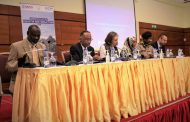23 August 2020, Sudan – The Green Climate Fund on Friday approved US$25.6 million in new funding for an innovative climate resilience project in Sudan, designed to promote agriculture, health, and food and water security. Around 1.2 million people from subsistence farming and nomadic pastoralist communities across nine states are set to directly benefit, with an additional 2.5 million people to benefit indirectly.
“Addressing the impact of climate change is a collective responsibility. We as a Government recognize this global responsibility and are committed to protecting the people of Sudan from the risks we are currently facing,” said Sudan’s Prime Minister, Dr. Abdalla Hamdok. “Left unchecked, climate change will derail our nation’s efforts to end poverty and conflict across the country.”
“With Green Climate Fund financing, and support from UNDP, the Sudanese Government is working to build resilient economies and livelihoods. This will help us minimize the impact of COVID-19, and put our people and planet first.”
Increasing changes in climate are leading to variations in rainfall and temperatures across Sudan’s arid and semi-arid drylands, pushing lives and livelihoods to breaking point.
Crop failures, the death of livestock, drought and other climate-related impacts are deepening poverty and reducing the capacity of people, communities and authorities to deal with other interconnected risks, such as COVID-19 and conflict.
Working at national and local levels, the new project will help Sudan address the challenges. Led by Sudan’s Higher Council for Environment and Natural Resources with support from the United Nations Development Programme (UNDP), the five-year project will provide deliver training and equipment, rehabilitate land for sustainable use, introduce new climate-resilient practices, and construct infrastructure such as wells, dams and water storage.
“This project will improve health, food and water security for 3.7 million people in Sudan, safeguarding them against the worsening, life-threatening impacts of a changing climate, while building resilience and infrastructure for the vital agriculture sector”, said UNDP Resident Representative, Selva Ramachandran.
“At the same time, together we will ensure institutional and community capacity is improved, vulnerable groups like women and youth receive targeted support, and Sudan’s natural resources are protected.”
Professor Rashid Hassan, Secretary General of the Higher Council for Environment and Natural Resources, said: “We are proud to launch this project, supporting the Sustainable Development Goals and Sudan’s Nationally Determined Contribution to the Paris Agreement. Importantly, it is a country and community-led initiative: the people and areas receiving support, and the needs being addressed, were identified after a comprehensive consultation process involving Federal and State authorities, communities, NGOs, the private sector, research institutions and relevant unions.”
Under the project, approximately 211,000 households will benefit from enhanced food production. This will include the introduction of climate-resilient seeds, training on the use and management of water resources, and the introduction of women’s farms and home gardens.
Towards building gender equality, the project will focus on women’s micro-finance, training and food security initiatives, as well as empowering them in decision-making through the formation of women groups.
In protecting life on land, the project will establish communal reserves used for grazing, rehabilitate 4,500 hectares of rangelands, and introduce sustainable livestock, agroforestry and land-management practices.
Access to clean water is an essential component in preventing the spread of diseases such as COVID-19. Improved access for drinking, cooking and cleaning, as well as livestock and irrigation will reach 200,000 households. To achieve this, the project will construct and rehabilitate wells and small-scale irrigation, sand dams, and water storage infrastructure.
The project leverages US$15 million in co-finance from Sudan’s Federal Ministry of Agriculture and Natural Resources, and a $540,000 grant from UNDP.







